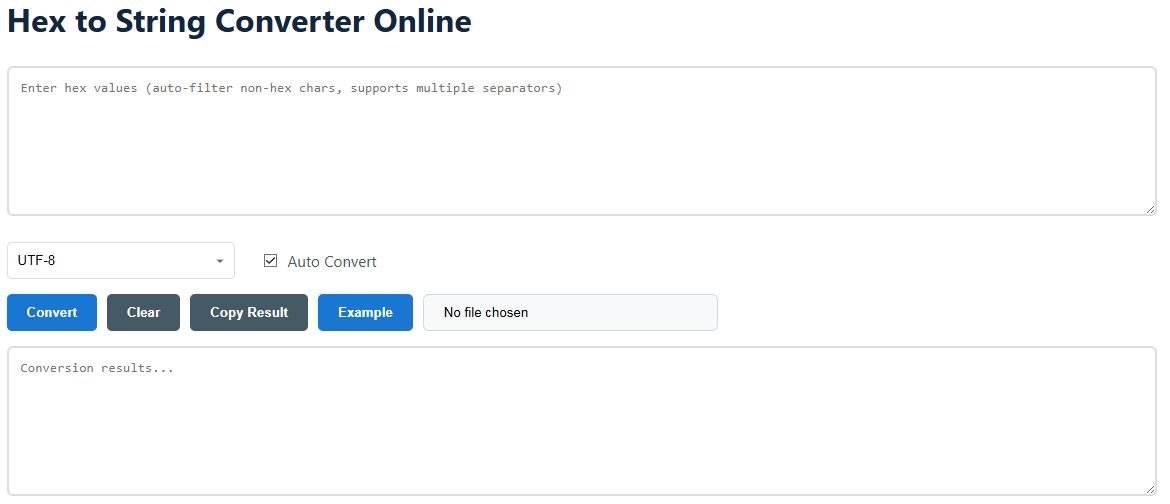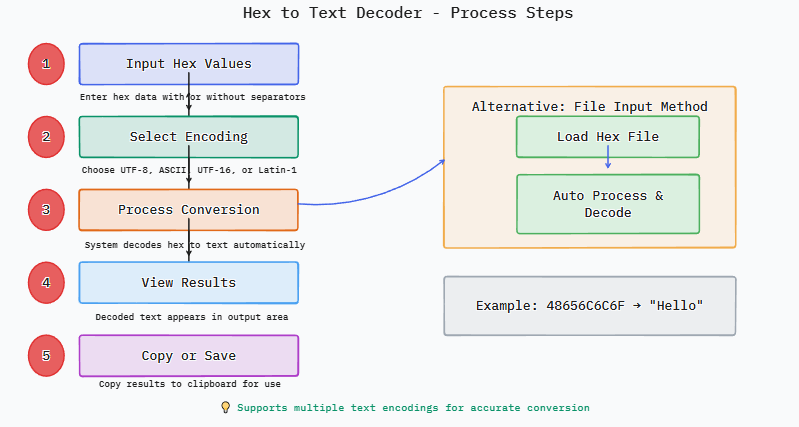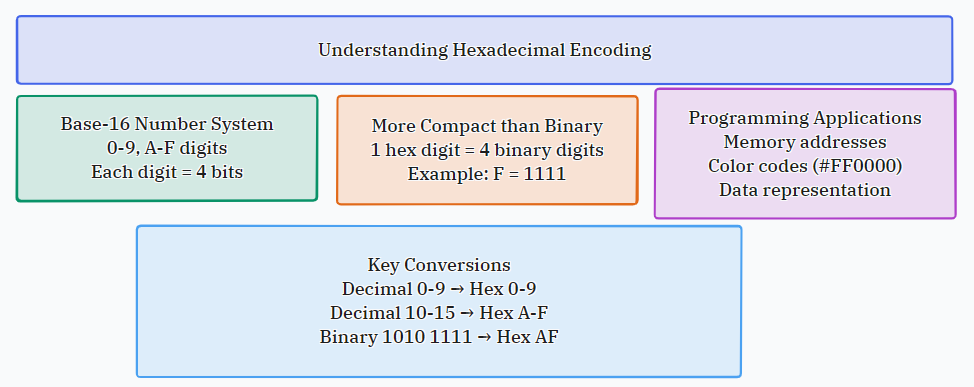Hex to String Converter Online
What is this Hex to String Tool?
This is a free online tool designed to convert hexadecimal (Hex) values into human-readable strings—it simplifies the process of translating machine-friendly hex data into text, with broad compatibility for different languages and encoding standards. It prioritizes ease of use, automation, and flexibility, making it suitable for developers, data analysts, or anyone working with hexadecimal data.
- Converts hexadecimal values to human-readable text
- Supports multiple character encodings (UTF-8, ASCII, ISO-8859-1, etc.)
- Handles various data formats including binary data and special characters
- Auto-cleans input from non-hex characters
- Supports file-to-hex conversion

How to Use:
The tool is straightforward to use with no complicated setup—just follow these clear steps to quickly decode your hex data into readable text:
- Enter hex values in the input box (with or without separators)
- Select desired text encoding from the dropdown
- Click Convert to see the decoded text
- Use Copy button to save results
- Load files directly using the file input

Understanding Hexadecimal Encoding
Hexadecimal (base16) is a numerical system widely used in programming and digital systems. Each hex digit represents 4 bits (0-9 and A-F), making it more compact than binary representation. Key technical aspects:
- Character Encoding Compatibility: UTF-8 handles 93% of web content, while ASCII is suitable for basic English text
- Byte Alignment: Hex values must form complete bytes (2 hex digits per byte)
- Endianness: UTF-16/32 require correct byte order (Big-Endian vs Little-Endian)

Hex Conversion FAQ
How are invalid hex characters handled?
No need to stress about cleaning up your input first! Our tool automatically filters out anything that’s not a hex character (only 0-9 and A-F count). Like, if you paste "48!@6c 70", it’ll just strip the !, @, and space and use "486c70" for conversion.
Why do I get garbled text (like "�" or random symbols)?
Garbled text usually boils down to three simple things: 1) You picked the wrong encoding (e.g., using ASCII for Chinese text won’t work). 2) Your hex input is missing some bytes (like cutting off the end of a long string). 3) The text has characters the encoding you chose doesn’t support. Start with UTF-8—it works for most languages, so it’s a safe first try!
Are there limits to the files I can upload?
Right now, we support text files (.txt) up to 10MB—any bigger might slow things down. And if you try to upload a binary file (like a .jpg or .exe), the tool will first turn its data into hex, then decode that hex into readable text (though binary files might still have some unreadable bits—that’s normal!).
Does the "Auto Convert" feature always work?
It’s on by default and works most of the time—type or paste hex, and the result updates right away. The only time it won’t? If your input is super long (like 10MB+ from a file) or if your browser is running slow. But even then, just click the "Convert" button manually, and it’ll catch up.
Can I use this tool to turn a string BACK into hex (not just hex to string)?
Great question! This tool is specifically for hex-to-readable text conversion—so it’s one-way here. But don’t worry, we do have a dedicated tool for converting strings to hex! If you need that reverse conversion, you can head right to String to Hex.
What if the "Copy Result" button doesn’t work?
Most of the time, it’s just a tiny browser glitch. Try refreshing the page first—if that still doesn’t work, you can manually select the text in the result box, right-click, and choose "Copy" (that old-school method always works!). Also, make sure the result box isn’t empty—you can’t copy nothing!
Is my hex input or converted text saved anywhere?
Nope—we don’t store any of your data. All the conversion happens right in your browser, so your hex codes and decoded text never leave your device. No need to worry about privacy here!
Encoding Standards Comparison
| Encoding | Characters Supported | Common Usage | Byte Length |
|---|---|---|---|
| UTF-8 | Full Unicode | Web, Modern Apps | 1-4 bytes |
| ASCII | 128 English | Basic Text | 1 byte |
| GBK | Simplified Chinese | Chinese Systems | 2 bytes |
| Shift_JIS | Japanese | Legacy Systems | 1-2 bytes |
Practical Applications in Development
- Network Analysis: When debugging network traffic (like TCP/UDP packets) or inspecting API requests/responses, payloads are often transmitted in hex format to ensure data integrity. Converting this hex to readable text lets you directly view the actual content—such as JSON/XML data, user input, or error messages—making it easy to identify issues like corrupted data, missing parameters, or unexpected response formats.
- Reverse Engineering: Binaries (e.g., .exe, .apk, or .dll files) store critical text data (like function names, file paths, version info, or hardcoded messages) in hex form. By converting this hex to strings, you can extract key details about how the program operates—for example, uncovering hidden configuration settings, identifying third-party libraries used, or understanding error handling logic—without access to the original source code.
- IoT Debugging: Most IoT devices (e.g., temperature sensors, motion detectors, or smart meters) transmit sensor data in hex to minimize bandwidth usage. For instance, a humidity sensor might send a hex value like "428A"—converting this to text helps you interpret the actual humidity reading (instead of working with raw hex) and verify if the device is sending accurate, uncorrupted data during testing or troubleshooting.
- Security Research: Malware, phishing tools, or suspicious scripts often encode malicious logic (e.g., command-and-control server URLs, encryption keys, or payload instructions) in hex to evade basic detection. Converting this hex to readable text reveals these hidden elements—helping researchers analyze threat behavior, block malicious connections, or develop countermeasures without executing risky code.
- Data Recovery: When systems crash, files get corrupted, or storage devices fail, memory dumps or disk fragments often contain leftover data in hex format. Converting this hex to text can rescue valuable information—such as partial documents, database entries, user credentials (in non-encrypted scenarios), or log snippets—that would otherwise be unreadable, aiding in partial data restoration or root-cause analysis of the failure.